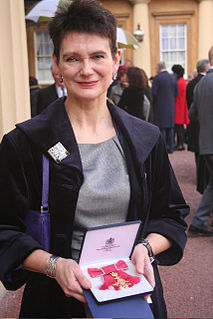A Quote by Laura Mullen
And Complicated Grief is a text that announces, from the start, in its citation of influence, dense intertextuality and hybridity, a failure of some apparent or usual protections, and a need to re-examine "identity" in the light of an acknowledgement of our entanglements and interdependence.
Related Quotes
With Orff it is text, text, text - the music always subordinate. Not so with me. In 'Magnificat,' the text is important, but in some places I'm writing just music and not caring about text. Sometimes I'm using extremely complicated polyphony where the text is completely buried. So no, I am not another Orff, and I'm not primitive.
Doth not this Æthereal Medium in passing out of Water, Glass, Crystal, and other compact and dense Bodies into empty Spaces, grow denser and denser by degrees, and by that means refract the Rays of Light not in a point, but by bending them gradually in curve Lines? And doth not the gradual condensation of this Medium extend to some distance from the Bodies, and thereby cause the Inflexions of the Rays of Light, which pass by the edges of dense Bodies, at some distance from the Bodies?
Another misconception is that if we truly loved someone, we will never finish with our grief, as if continued sorrow is a testimonial to our love. But true love does not need grief to support its truth. Love can last in a healthy and meaningful way, once our grief is dispelled. We can honor our dead more by the quality of our continued living than by our constantly remembering the past.
Perhaps the deepest reason we are afraid of death is that we do not know who we are. We believe in a personal, unique, and separate identity; but if we dare to examine it, we find that this identity depends entirely on an endless collection of things to prop it up: our name, our "biography", our partners, family, home, job, friends, credit card ... It is on their fragile and transient support that we rely for our security. So when they are all taken away, will we have any idea of who we really are?
The identity of just one thing, the "clash of civilization" view that you're a Muslim or a Hindu or a Buddhist or a Christian, I think that's such a limited way of seeing humanity, and schools have the opportunity to bring out the fact that we have hundreds of identities. We have our national identity. We have our cultural identity, linguistic identity, religious identity. Yes, cultural identity, professional identity, all kinds of ways.
We all make mistakes, we all have fears, and we all have weaknesses. Behind all that is our essential self. When our essential self has made contact with another, the light is dazzling and would fill the universe. The challenge of enchantment is to remain faithful to that light, to believe in it when it is not so apparent. Then that light becomes an incandescent glow and it wraps itself around everything.







































